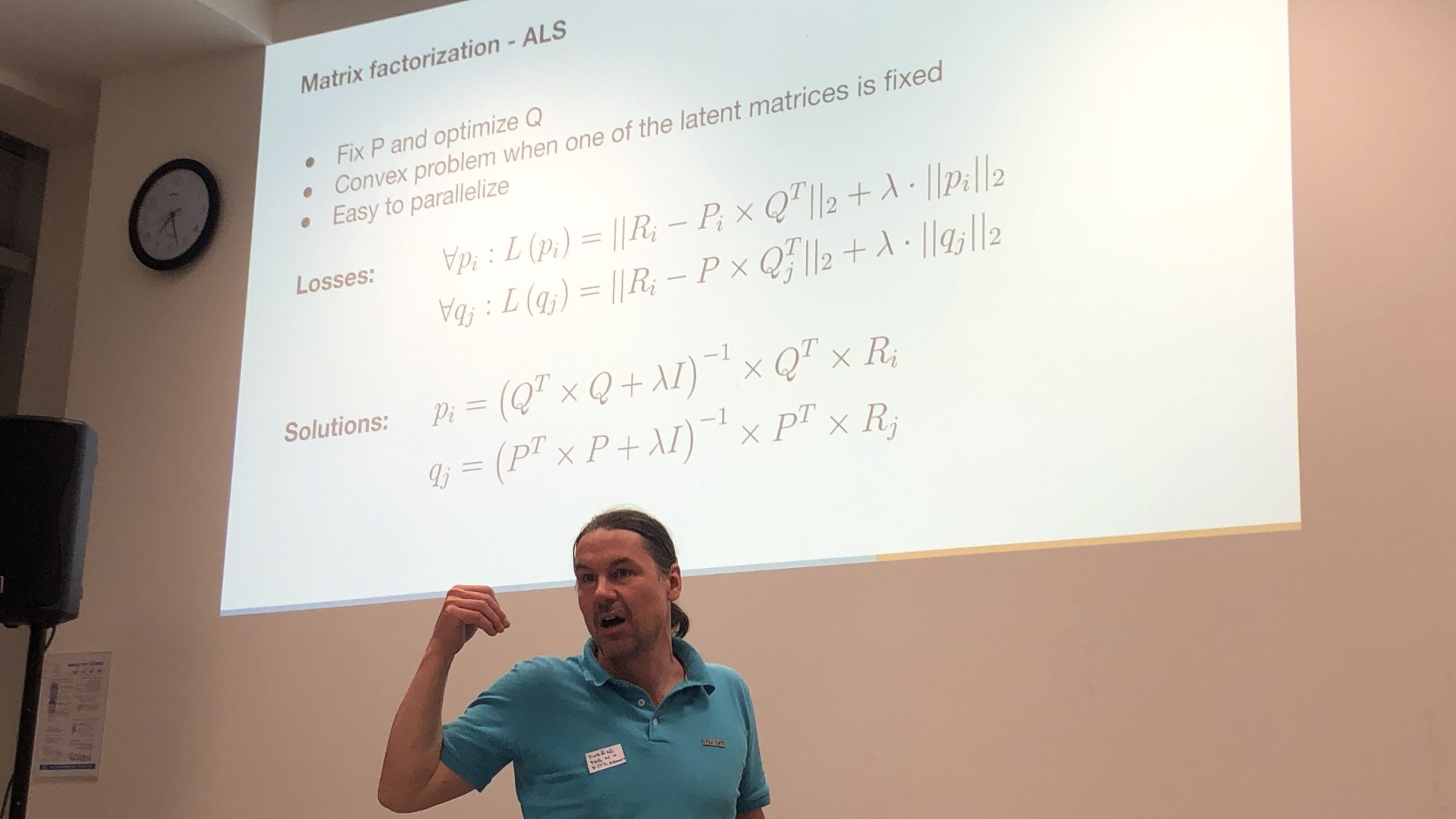When AI recommends what to buy
As part of the prg.ai Minor, students meet top AI experts in lectures. One of them is Assoc. Pavel Kordík, who gave a lecture at the Faculty of Information Technology of CTU this March on the topic of the latest research and real-world applications of recommending systems.

The talk first introduced recommendation systems in general. They are built on connecting users with products and user interactions in the form of the so-called user-item or interaction matrix. Such interactions include, for example, rating of items by users, products that the user has only viewed, or the time spent viewing each item. Subsequently, the recommendation system is able to offer to the user items that, based on the data collected, they might be interested in. Similarity between users and products can be calculated using several methods, such as the nearest neighbour method, matrix factorisation or a neural network.
Multi-armed bandit as a solution to a classic dilemma?
When filling in the user-item matrix, we may encounter several problems. The most well-known is the cold-start problem, where we have very few interactions with a new user or product. In practice, it looks like the system is trying to recommend a product to the user, but it does not know what to recommend, since it does not know the user’s preferences. Therefore, it will, for example, offer them popular products. However, the user may not be satisfied with these and so does not interact with the so-called long-tail products, which again delays the completion of the relevant parts of the matrix. An example of a solution to this problem for new products is to examine the similarity of their attributes to those products that the user has already seen or bought, so that we can place the new product in certain categories and start to make at least a partially informed recommendation. Here we encounter the classic dilemma between exploration and exploitation based on the reinforcement learning theory.

A common solution to such problems is the so-called multi-armed bandit approach. For streaming platforms, the recommending system gets rewarded for the number of times the user views the videos. When a recommendation is requested, it offers the user an item and determines whether the user has watched it; if so, the RS is rewarded. Gradually, the system refines its strategy, which is based on the fixed assumption that there are popular items that do not change with time for most users. Of course, this may not be true, which is why our researchers like Rodrigo Alves are working on better approaches to bandit recommendations that seek a balance between so-called loyal users and curious ones who do not respond to “all time favorite” items. Of course, there are a number of other approaches besides bandit algorithms. You can see the latest ones, for example, at the RecSyS conference.
It is important to test research on real data
As Recombee is a startup that runs a joint research lab with the Faculty of Information Technology, there was also a discussion about the applicability of published research in practice. Participants agreed that it is important for researchers to compare new models and approaches on well-grasped metrics and have the opportunity to test them on real data. After all, we don’t do research to outperform other models by some tiny fraction on some obscure metric, but we strive to ensure that the results of our research are used as much as possible.
Pavel Kordík is one of the founders of prg.ai and a co-founder of several startups, one of which is Recombee. He sees startups as an ideal platform for transferring knowledge from academia to practice.
Recombee is a global player in developing recommendation algorithms and personalized search in the form of a cloud service. It is able to react in real time to changes in recommended items and customer behaviour in areas such as media, e-shops, online marketplaces, job, education or real estate portals.
- Recombee services are used by Prima, Mafra, Czech Radio, Slickdeals, Audiomack, Zumper, Showmax and hundreds of other customers worldwide.
- Read more about recommendation systems on the Recombee blog: https://www.recombee.com/blog.html
Pavel Kordik’s articles can be found at https://twitter.com/pavelkordik or https://medium.com/@pavelkordik
Next up from prg.ai

Typical Prague AI firm is young, self-sufficient, and export oriented, shows our new comprehensive study
130 companies, 11 interviews, 9 business topics. Explore all that and more in the unique study authored by prg.ai, which contains an overview of last year's most notable events on the local AI scene or articles on the future of AI or gender equality in research.

prg.ai newsletter #41
The first spring edition of our newsletter! Get the latest prg.ai updates, exciting news from the Prague AI scene, a curated list of interesting events, open positions, and much more. Stay in the loop!

prg.ai newsletter #40
The fortieth milestone issue of the prg․ai newsletter is packed with news and intriguing facts not only from the Prague AI scene. Keep reading so you don't miss out on anything!

prg.ai newsletter #39
What did the first month of 2024 bring, and what can you look forward to in February? Find out in the next prg.ai newsletter. Check out what's new on the artificial intelligence scene (not only) in Prague.

